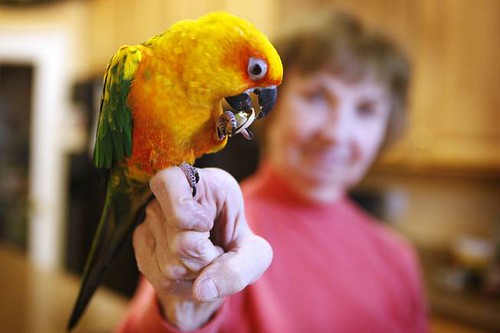 Olive is a Jenday conure who is fostered at the home of Merlyn and Lynn Harold in Henderson on Monday, December 12, 2011.Photo: Leila Navidi When Alex, an African Grey Parrot known to converse and vocally identify colors and objects, died in 2007, he garnered obituaries in national publications for his role in a 30-year study that examined intelligence in parrots.
Olive is a Jenday conure who is fostered at the home of Merlyn and Lynn Harold in Henderson on Monday, December 12, 2011.Photo: Leila Navidi When Alex, an African Grey Parrot known to converse and vocally identify colors and objects, died in 2007, he garnered obituaries in national publications for his role in a 30-year study that examined intelligence in parrots.
Not every parrot’s skills are on par with Alex’s, but their abilities to mimic human voices, combined with their demand for social and intellectual stimulation, endear them to their owners. Those traits are also creating unique challenges in this crippled economy.
The recent uptick in birds arriving in the care of Southern Nevada Parrot Education, Rescue and Rehoming Society can best be described as a microcosm of the economic indicator, says the group’s founding president, Madeleine Franco. She says they’ve been taking in two and three birds a week for the past two months — a considerable and steady jump in numbers for a group that has rehomed more than 100 parrots since 2007.
Parrot foster and rehoming groups are common, given that parrots often outlive their owners, but of late, Franco says, owners are giving up their birds either because they’ve taken on additional jobs or they’re losing their homes and/or scaling down and moving into apartments not always friendly to noisy pets.
“We’re getting more of the vocal birds these days,” Franco says. Indeed, the group’s website lists quite a few cockatoos and conures up for adoption. Until then, the birds live in foster care provided by the organization’s members.
“They’re the loves of our lives and we need to take care of them. We’re all bird owners, and I’m sure some of us will need this someday. Birds live a long time.”